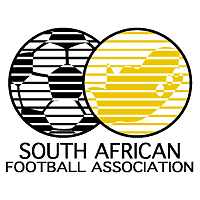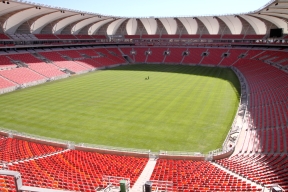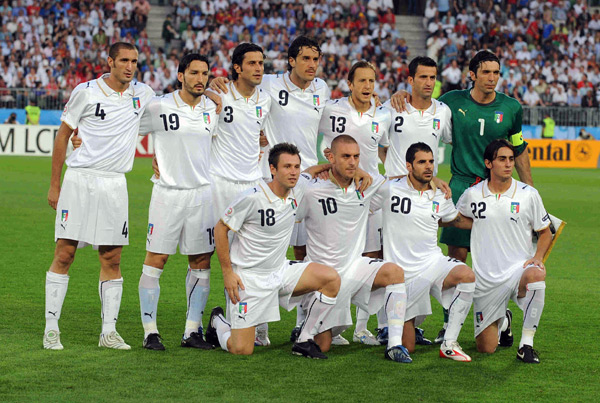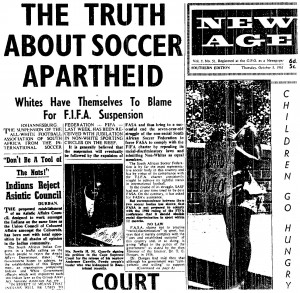
Kick Off magazine reports that Kirsten Nematandani emerged victorious in the contentious SAFA presidential race during a marathon annual general meeting in Joburg. Nematandani was elected unopposed after 2010 LOC Chief Executive Officer Danny Jordaan and Chairman Irvin Khoza withdrew from the race.
In South African football circles, the outcome of this hotly contested election (more than 100 police officers searched delegates at the Southern Sun hotel for weapons), was widely seen as a victory for Danny Jordaan’s Football Transformation Forum at the expense of PSL boss Irvin Khoza. According to the Mail and Guardian, the new SAFA chief may face a legal challenge, but aims to go ahead and meet soon with SA president Jacob Zuma, Minister of Sport Makhenkesi Stofile and FIFA president Sepp Blatter to outline the way forward for South African football.
Sept. 29 update: press conference erupts in chaos as PSL issues statement declaring Safa’s presidential election to be unconstitutional and illegitimate. No comment from FIFA.
Author: Peter Alegi
African Media and the World Cup

The 2009 Highway Africa Conference, held recently at Port Elizabeth’s new World Cup stadium (photo above), helped African media be better prepared to cover the 2010 World Cup, according to Guy Berger, head of Rhodes University’s School of Journalism and Media Studies. African media should work to ensure that “coverage is not only focused on the glitz and glamour aspect of the World Cup,” Berger said, “but must be extended to critical evaluation of socioeconomic consequences.”
In a keynote address, Saleem Badat, Rhodes University Vice-Chancellor and licensed football coach, cautioned African journalists against uncritical reporting: “As a supposedly African event, it remains to be seen how, in what ways, and to what extent the media coverage of the 2010 FIFA World Cup will differ from that of previous World Cups.”
South Africa and FIFA: Defining Moment
FIFA’s suspension of South Africa from world football in September 1961 was one of the first international indictments of apartheid. Click here to read a recent piece on this major event in The Financial Times of London. It is a powerful example of how Africans accelerated the democratization of football and made the game more fully global.
FIFA denied my request for tickets so I followed the Confederations Cup from home. I drew on my observations from afar as well as media coverage and conversations with friends in South Africa to learn these five things from the tournament:
1. This beautiful yet scarred country will host an eventful World Cup next year. The stadiums are nice and the climate in different cities may surprise visitors. Also, the difficulties with transport, accommodation, communications, and moving people to the stadiums may be mitigated by next year but are not likely to disappear.
2. The Confed Cup is not a terribly interesting competition. It features too many marginal sides (New Zealand, Iraq, South Africa) and tired European giants (Spain and Italy). No wonder we had to depend on the depth and individual brilliance of Brazil and the do-or-die attitude of the improving USA for entertainment.
3. Despite what the organizers tell us, the vuvuzelas are not part of South Africa’s ‘traditional’ fan culture. The horns appeared in the mid-1990s and did not become widespread until a few years ago. And they were ‘invented’ by a white guy.
4. The trend of the past decade that saw raw speed and set pieces decide so many matches will probably continue in 2010. Given the heavy-handed emphasis on defensive tactics, the pace of players like Kaka’ offers precious opportunities to burst through defensive walls and exploit open space on counter-attacks. Corners and free kicks are key, just ask the USA and South Africa.
5. The 2010 World Cup is a huge national project aimed at enhancing ‘Brand South Africa’ — the image of the country as a modern, democratic, business-friendly, tourist destination. Football-crazy South Africans legitimize this political and economic agenda, even though they pay billions to host the event while FIFA keeps most of the financial profits.
The Classics: Italy vs Zambia, 1988
In the 1960s African teams were not taken seriously by FIFA, which denied them a single guaranteed place in the World Cup finals until 1970. Yet African sides performed well in Olympic football tournaments. Ghana reached the quarterfinals in 1964 and Nigeria drew with Brazil in 1968. But most impressively, Zambia demolished Italy 4-0 in 1988. Led by Kalusha Bwalya—the greatest Zambian player ever—Chipolopolo (The Copper Bullets) proved that African national teams could hold their own on the world’s stage. Tragically, many of the stars of that game died in a plane crash on 27 April 1993.
Read the report about the plane crash here. Football historian, Paul Darby, has written about these tragic events in a book about disasters.
The end of an era for Italy

Italy is a country ruled by old men (over 50). The economy, the government, and, yes, the football system too. This gerontocratic culture of power is crucial to understanding why the Azzurri performed so horribly in the Confederations Cup in South Africa.
Aging world champions like Cannavaro (age 35), Toni (32), Zambrotta (32), Camoranesi (32), and Gattuso (31) lacked the enterprise, motivation, and physical attributes necessary to compete at this level. New blood is badly needed. But only New Jersey-born Giuseppe Rossi (22) was given enough playing time. Compare this inclination to avoid youthful vigor and imagination to the story of Lionel Messi — a regular for Barcelona and Argentina since age 17 and 18 respectively.
